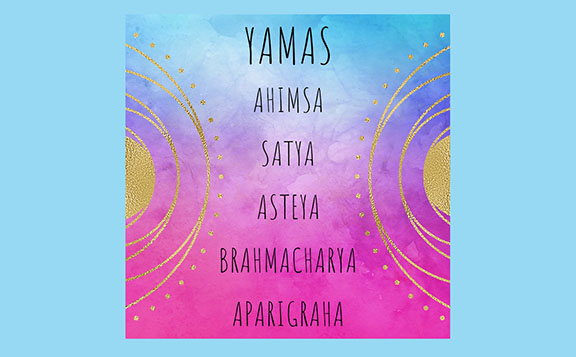 Rev. Jaganath, Integral Yoga Minister and Raja Yoga master teacher, has spent a lifetime delving into the deepest layers of meaning in Patanjali’s words within the Yoga Sutras. Our series continues with sutra 2.30. In several prior sutras, Patanjali explained how Self-realization, the goal of Yoga, is blocked by the kleshas. In sutra 2.29, Patanjali explained how the kleshas can be removed by following the eight-fold path of Yoga. In sutra 2.30, we learn more about the first of the eight limbs: yama, comprised of five universal resolves.
Rev. Jaganath, Integral Yoga Minister and Raja Yoga master teacher, has spent a lifetime delving into the deepest layers of meaning in Patanjali’s words within the Yoga Sutras. Our series continues with sutra 2.30. In several prior sutras, Patanjali explained how Self-realization, the goal of Yoga, is blocked by the kleshas. In sutra 2.29, Patanjali explained how the kleshas can be removed by following the eight-fold path of Yoga. In sutra 2.30, we learn more about the first of the eight limbs: yama, comprised of five universal resolves.
Sutra 2.30: ahimsā-satya-asteya-brahmacarya-aparigrahāḥ yamāḥ
Yama – the universal resolves – consists of:
- Ahimsa – harmlessness
- Satya – truthfulness
- Asteya – nonstealing
- Brahmacharya – a life dedicated to self-mastery and liberation
- Aparigraha – freedom from craving to possess sense objects
ahimsā = harmlessness (See 2.35); absence of the desire to kill or injure
from a = not + himsā = injury, harm, hurt, hostile, mischief, the three wrongs: hatred, abusive language, and acts of violence, from han = strike, kill
Ahimsa is the highest of the yamas because the impulse to engage in violent thoughts, words, and deeds arise from feelings of fear – from real, exaggerated, or imagined threats. Competition for resources, lust for power and wealth, uncertainty and change, all played against the underlying background of duhkha, creates a fertile ground for violence. Note that the other yamas all help create and support ahimsa.
On a personal level, the impulse to do harm, to dislike, even hate others has to be pacified and transcended in order to progress spiritually. Certainly all of the Yoga practices and principles help accomplish this, but perhaps faith (see Ishvara pranidhanam, 2.23) and the four locks and four keys (Brahma Viharas), sutra 1.33, stand out as the foremost.
On a societal level, no real progress can be made in communal ideals – peace, harmony, prosperity, opportunity – until a way of reducing and controlling violence is devised. In fact, the creation of legal systems, a major advancement in human history, was developed, not primarily to find truth in disputes, but to end cycles of violence and retaliation – tragic situations that we can still see today. While the military, police forces, judges, lawyers, and juries are all essential components of managing and preventing violence, cultivating, teaching, and living ahimsa is more beneficial as it gets to the root of the problem.
We can regard the rest of the yamas from both individual and societal levels, even brahmacharya (as constructive sexual relationships) whose societal benefits include helping to cultivate and maintain clear, honest, and fruitful relationships that form the basis of societies.
satya = truthfulness; authenticity, sincerity, veracity, genuine, sincere, honest, pure, virtuous, good, successful, reality, speaking the truth, effectual, valid
from sat = being, existing, occurring, happening, being present, abiding in, belonging to, living, lasting, enduring, real, actual, as any one or anything ought to be, right, beautiful, wise, venerable, a being, beings, creatures, that which really is, existence, essence, the true being or real existence, that which is good or true, reality + suffix, ya = meaning to have the quality of the word it is attached to. In this case, it means to have the quality of existence or reality
Sat is from the root, as = to be, exist.
asteya = nonstealing (See 2.37); from a = not + steya, theft, robbery, larceny, anything stolen or liable to be stolen, anything clandestine or private, from stai = to steal
brahmacarya = a life dedicated to self-mastery and liberation (See 2.38); continence, celibacy, chastity, behavior, conduct, the due observance of all rites and customs, a religious mendicant’s life, practice, dwelling in brahma, the path that leads to brahma (the Absolute Reality)
from brahma = relating to sacred knowledge, prescribed by the Vedas, scriptural, relating to the brahmins or the priest class, belonging to an inhabitant of brahma’s world of man, one versed in sacred knowledge, from brh = greater than the greatest + charya = engaged in, to be practiced or performed, driving in a carriage, proceeding
In this text, brahmacharya is given a broader meaning than the usual translations of continence or celibacy. While these are valid translations, we can consider a wider context of the word, where it means to regulate all aspects of life in order to create and conserve energy and then apply that energy to the goal of liberation.
The roots of the word mean to behave in a way that leads to Brahman, the Absolute. Brahmacharya, then, may be best understood as a moral, ethical life dedicated to liberation through self-mastery, one-pointedness of mind, and dedication (selfless service, devotion to Ishvara).
When considering brahmacharya as sexual restraint, it can also include not using sex for manipulation or to work out psychological problems. Brahmacharya within a relationship can be defined as physical intimacy for expressing love, caring, fidelity, generosity, and devotion to another. In this context, brahmacharya is also about learning to discriminate between lust and love.
aparigrahāḥ = freedom from craving for sense objects (See 2.39)
nongreed, nonpossession, renunciation of nonessentials, poverty, deprivation, freedom from clinging, nonacceptance, non-possessiveness, renouncing, grasping for what is beyond one’s needs, a desire that takes over the entire person
from a = not + parigraha = laying hold of on all sides surrounding, enclosing, fencing around (especially the sacrificial altar by means of three lines or furrows), wrapping around, assuming a form, comprehending, summing up, totality, taking, accepting, receiving or anything received, a gift or present, acquisition, possession, property, household, family, attendants, a house, abode, root, origin, hospitable reception, taking a wife, choice, selection, understanding, conception, undertaking, beginning, performance of, homage, reverence, grace, favor, help, dominion, control, force, constraint, punishment, claim on, relation to, concern with, a curse, oath, an eclipse of the sun, the reserve of an army.
from pari = toward, against, away from, around, about (in reference to space and time), fully, beyond, away, outside of + graha = holding, seizing, obtaining, perceiving, recognizing, any state which proceeds from magical influences and takes possession of the whole person, the part of the bow that is grasped by the hand, receiving, accepting gifts, from grah = to grasp, seizing, holding, obtaining, name of a group of demons or spirits who seize or exercise a bad influence on the body and mind of humans (causing insanity), any state which proceeds from magical influences and takes possession of the human being, the five sense organs + manas, the beginning of any piece of music, keeping back, obstructing, imprisoning, effort
Literally, to not grasp beyond, around, or away, parigraha indicates a state of mind so overtaken by a passionate desire for something that one is tempted to break moral and ethical precepts in order to grasp, hold onto, or obtain material possession or status. Therefore, greed is not just wanting something or more of something. Greed drives us to actions that harm others or ourselves in some way. It’s when our desire for material advantage allows us to disregard the welfare of others.
Parigraha, a root of the word, has the sense of dallying or wasting time. It suggests an ethically, morally and spiritually fruitless mindset that takes possession of the individual. In other words, greed crowds out or diminishes most other beneficial and selfless thoughts, goals, and objectives.
The fact that one of the roots of the word, graha, also means, a state which precedes from magical influence and takes possession of the whole person, shows that self-centered desire, overpowers our authentic self, our innate humane nature.
Aparigraha has also been translated as not having possessions. One way of practicing it is to contemplate the fact that we need not ever feel that we possess anything. It is the feeling of ownership that causes many of our problems. Instead, think of all of the objects as having been provided for your service or to provide opportunities for learning and growth.
Hoarding, grasping, and harboring the unrealistic expectation that any thing can bring happiness is a manifestation of ignorance. Happiness always comes from within, not from any object or situation. Enjoy things when they come for as long as they remain, and send them off in peace when they go.
yamāḥ = left untranslated; precepts of self-control
About the Author:
 Reverend Jaganath Carrera is and Integral Yoga Minister and the founder/spiritual head of Yoga Life Society. He is a direct disciple of world renowned Yoga master and leader in the interfaith movement, Sri Swami Satchidananda—the founder and spiritual guide of Satchidananda Ashram–Yogaville and Integral Yoga International. Rev. Jaganath has taught at universities, prisons, Yoga centers, and interfaith programs both in the USA and abroad. He was a principal instructor of both Hatha and Raja Yoga for the Integral Yoga Teacher Training Certification Programs for over twenty years and co-wrote the training manual used for that course. He established the Integral Yoga Ministry and developed the highly regarded Integral Yoga Meditation and Raja Yoga Teacher Training Certification programs. He served for eight years as chief administrator of Satchidananda Ashram–Yogaville and founded the Integral Yoga Institute of New Brunswick, NJ. He is also a spiritual advisor and visiting lecturer on Hinduism for the One Spirit Seminary in New York City. Reverend Jaganath is the author of Inside the Yoga Sutras: A Sourcebook for the Study and Practice of Patanjali’s Yoga Sutras, published by Integral Yoga Publications. His latest book, Patanjali’s Words, is coming soon from Integral Yoga Publications.
Reverend Jaganath Carrera is and Integral Yoga Minister and the founder/spiritual head of Yoga Life Society. He is a direct disciple of world renowned Yoga master and leader in the interfaith movement, Sri Swami Satchidananda—the founder and spiritual guide of Satchidananda Ashram–Yogaville and Integral Yoga International. Rev. Jaganath has taught at universities, prisons, Yoga centers, and interfaith programs both in the USA and abroad. He was a principal instructor of both Hatha and Raja Yoga for the Integral Yoga Teacher Training Certification Programs for over twenty years and co-wrote the training manual used for that course. He established the Integral Yoga Ministry and developed the highly regarded Integral Yoga Meditation and Raja Yoga Teacher Training Certification programs. He served for eight years as chief administrator of Satchidananda Ashram–Yogaville and founded the Integral Yoga Institute of New Brunswick, NJ. He is also a spiritual advisor and visiting lecturer on Hinduism for the One Spirit Seminary in New York City. Reverend Jaganath is the author of Inside the Yoga Sutras: A Sourcebook for the Study and Practice of Patanjali’s Yoga Sutras, published by Integral Yoga Publications. His latest book, Patanjali’s Words, is coming soon from Integral Yoga Publications.
